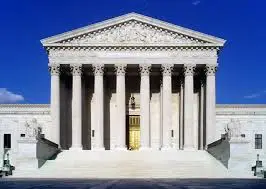
In checking to see if a potential DUI suspect is, indeed, driving while intoxicated, police have two options. There is a breathalyzer test, which measures blood-alcohol content through breathing through a straw. There is also a blood test, which is considerably more invasive but more accurate. Recently, there has been question as to whether or not police can arrest people refusing to take these tests. The Supreme Court has weighed in on the topic.
On June 22, the Supreme Court ruled that police may arrest drivers refusing to take a breathalyzer test, but they cannot arrest drivers refusing the more invasive blood test.
The Supreme Court sympathized with the intentions of laws existing in 13 states – to get blood drawn before alcohol levels recede – the majority said that warrants must be obtained before blood tests can be performed. This helps protect drivers’ constitutional rights outlined in the Fourth Amendment.
In comparison, five of the justices argued that the breathalyzer test does not implicate privacy concerns. Therefore, police may arrest those refusing to take them.
Justice Samuel Alto wrote in his opinion: “Because breath tests are significantly less intrusive than blood tests and in most cases amply serve law enforcement interests, we conclude that a breath test, but not a blood test, may be administered as a search incident to a lawful arrest for drunk driving.”
Four of the chief justices sided with Alto. Two liberal justices, Ruth Bader Ginsberg and Sonia Sotomayer, said that warrants should be required for both tests. Standing alone was Justice Clarence Thomas, who said that differentiating between the two was “hair splitting” and that warrants shouldn’t be required for either one.
While the majority of the justices agreed that blood tests were invasive, the breath test divided them most in April. They agreed that blowing into a tube was only a minor invasion, but they questioned why police would not be able to obtain a warrant within minutes, even in rural areas.
Ian Gershengorn, who represented the states, said that in rural areas, judges were often not available around the clock to secure warrants.
During the oral argument made in April, Alito remained on the side of the states. He said that the reason drivers did not want to submit to a blood-alcohol test is because they simply did not want their blood-alcohol levels to be measured.
If you have been arrested and charged with DUI, you will need legal representation. Our attorneys specialize in DUI defense. Contact us today.



